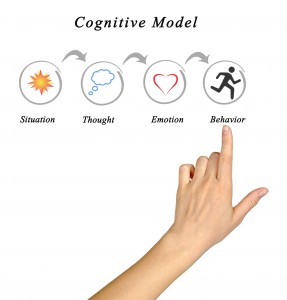
Our clinical psychologists primarily use Cognitive Behaviour Therapy (CBT), which is considered the gold-standard’ treatment for most psychological problems. We also use other evidence-based treatments such as Mindfulness and Acceptance and Commitment Therapy (ACT), Dialectical Behaviour Therapy (DBT), Schema Therapy, and Family Therapy which are widely becoming recognised as effective treatments for many psychological conditions.
What does the research say about CBT?
Controlled clinical trials have repeatedly shown that CBT is superior to other forms of psychotherapy for many psychological conditions and may be more effective in the long-term than relevant medications. Research indicates that CBT is as effective as antidepressant medication for the treatment of depression, and a preferable treatment to medication in the treatment of most anxiety disorders.
What is CBT?
As the name suggests, ‘CBT’ focuses on the role of ‘cognition’ (our thoughts, assumptions and beliefs) and ‘behaviour’ (what we do) in determining how we feel and our general well-being. Therapy focuses on helping people to understand how their thoughts, feelings and behaviours are connected, so that they can begin to think, feel and behave in more helpful ways.
Unlike some other kinds of psychotherapy, CBT is designed to be a short-term, goal-focused therapy. It is not simply just ‘talking” about your problems. It is about self-mastery. The main goal of therapy is for the client to understand and change unhelpful thinking patterns and behaviours that are maintaining their illness or issue. The therapist teaches specific skills that are proven to be effective in managing the client’s illness. The client is expected to take an active role by learning and practising these skills. This approach allows clients to make positive changes quickly. The emphasis on learning and skill implementation is designed with the expectation that clients can maintain the changes they have made beyond the course of therapy.
How long does it take to learn CBT?
CBT is designed to be a short-term therapy with most issues needing between 6 to 12 sessions. However, there is no true standard. Some very simple problems may only require 2-3 sessions, while more complex problems may require longer-term work. Your therapist can often provide an estimation of how long therapy should take after the initial assessment.
What happens in CBT?
Whilst all therapists and problems are unique, CBT is a fairly structured type of therapy, and there are some basic elements that you can expect to experience.
Assessment
Therapy usually begins when the therapists conducts an initial assessment. The idea of the assessment is to get a thorough understanding of the problem to aid treatment planning and goal setting.
Early stages of CBT
Early stages of CBT usually involve psychoeducation, in which you will learn about the problem as well as factors that cause and maintain the problem.
Later stages of CBT
Later stages of therapy focus on identifying and challenging unhelpful thoughts, beliefs and assumptions, and changing behaviours that contribute to and/or maintain the problem. CBT also involves teaching basic coping and problem-solving skills.
Final stages of CBT
The final stages of therapy focus on preventing relapse and preparing the client for the future.
If you would like more information about our treatments, or to book an appointment with one of our clinical psychologists, please email or call the clinic on 02 9438 2511.
